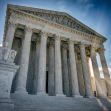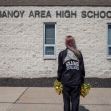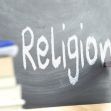After every football game, a high school coach in Washington State knelt on the 50-yard line and prayed. He was often joined by a majority of his team. But when the parents of an atheistic player complained, the school district ordered the coach to stop his prayer sessions. He refused and was fired. Now the U.S. Supreme Court will hear his case this term, as it considers whether his prayers in public schools are protected by the First Amendment.
The coach, Joe Kennedy, is appealing a March 2021 decision by a three-judge panel of the U.S. Court of Appeals for the Ninth Circuit that affirmed the decision of the U.S. District Court for the Western District of Washington. On January 14, the Supreme Court agreed to hear Kennedy’s case concerning the constitutionality of the Bremerton School District’s (BSD) order that he stop praying on the field. BSD argued they did so because they could not violate the Establishment Clause of the U.S. Constitution.
Coach Kennedy, who worked at BSD from 2008 to 2015, claimed BSD violated his First Amendment rights and the Civil Rights Act of 1964 when they fired him. BSD was found to have acted legally because it was “compelled” by the Establishment Clause of the Constitution to prohibit prayer sessions on its public school ground. Kennedy’s Civil Rights Act claims also failed when the Ninth Circuit determined the District had a “legitimate nondiscriminatory reason for its adverse employment actions.”
The Ninth Circuit opinion was written by Judge Milan D. Smith, Jr. with a concurrence by Morgan Christen, joined by Circuit Judge Dorothy Nelson. It opens with facts about the controversy and explains that Kennedy warned BSD that he would not stop praying and would “fight” for his right to pray by seeking support from the Christian community and the media. After news stories and a Facebook post that said, “I think I just might have been fired for praying,” scores of protestors joined him on the field. BSD supporters were threatened after protests in support of the coach made national news.
Kennedy’s contract as head coach of the junior varsity team and assistant coach of the varsity team expired at the end of every season. BSD has a policy about mandatory limits on prayer called “Religious-Related Activities and Practices,” but an investigation revealed that the coaching staff “had received little training about the policy. To contradict the policy, Kennedy quoted a section of his contract that said he was to be a “coach, mentor and role model for the student athletes.” As a practicing Christian, he said that his religious beliefs “required” him to give thanks at the end of each game for the player’s “safety, sportsmanship and spirited competition.” His prayers lasted only about 30 seconds.
Although the sessions were short and player participation was voluntary, not everyone was happy about the prayer sessions. The coach of an opposing team told the principal that Kennedy had asked his players “to join him in prayer on the field.” Later, the parent of the team member who was an atheist, complained, saying he, “felt compelled to participate” because “he felt he wouldn’t get to play as much if he didn’t participate.”
BSD made several attempts to accommodate Kennedy’s prayer practice, but none of them satisfied him or his need for publicity. The District said he could continue coaching, but his motivational speeches had to be “secular in nature so as to avoid alienation of any team member.” They said his prayers could continue but “must be physically separate from any student activity and students may not be allowed to join.” Those did not satisfy him. The coach said these restrictions made him feel “dirty” because a failure to pray broke “his commitment to God.”
After a few months, Kennedy demanded that BSD’s restrictions on his prayers be lifted. He informed the District that his mid-field prayers would resume at the end of the October 16, 2015 game. The media and photographers were alerted and national publicity again followed. BSD had to hire police to control angry crowds of supporters. Following the game, he was placed on administrative leave and was not rehired for the following year. Kennedy moved for a preliminary injunction of his dismissal. The district court denied it and the Ninth Circuit affirmed.
Justice Smith’s Ninth Circuit opinion first reviewed the standard for a grant of summary judgment. After discussing precedent about the limits of public employees’ religious activities, he reviewed the question before the court. He said it was “whether an objective observer, familiar with the history (of the case), coupled with (Kennedy’s) pugilistic efforts to generate publicity in order to gain approval of those on-field activities, would view BSD’s allowance of that activity as “stamped with (the) school’s seal of approval.” He concluded, “Here, the answer is unquestionably yes.” The Establishment Clause, which prohibits the government from making “any law respecting an establishment of religion” was violated. Public schools are part of the government.
The opinion next reviewed Kennedy’s Free Exercise claim, based on the First Amendment’s clause that “reserves the right of American citizens to accept any religious belief and engage in religious rituals.” Again, Smith reviewed precedent and wrote that BSD acted according to law. He found a “compelling state interest to avoid violating the Establishment Clause,” and justified the free speech limitation because BSD had repeatedly tried to “work with Kennedy to develop an accommodation” that would offer him options for his prayers that were “narrowly tailored” top protect his free speech rights
Kennedy’s claims under Title VII of the Civil Rights Act of 1964 were similarly denied because the Court found religion was not a motivating factor in his dismissal. Rather, his contract was correctly not terminated due to his “failure to adequately perform his job.” He received no disparate treatment.
In a term during which the court has already agreed to hear several church v. state cases, Kennedy v. Bremerton School District was another controversial addition to the Supreme Court docket. The exact boundaries of the Establishment Clause are now rather blurred. The Supreme Court has allowed religious prayers to open legislative sessions and permitted public funds to be used for bussing to and from religious schools. However, it has banned religious displays at courthouses and would not allow state funding to supplement the salaries of teachers at religious schools.
The current Supreme Court term could either add to or clarify the confusion. In addition to Coach Kennedy’s case, the Justices have agreed to hear cases about public funding for private schools that teach religion, spiritual advisors in chambers where prisoners are being executed, and whether religious flags can fly on city flagpoles. Of course, there is also Roe v. Wade, establishing a women’s right to choose and vehemently opposed by those who argue their religious belief in the right-to-life.






